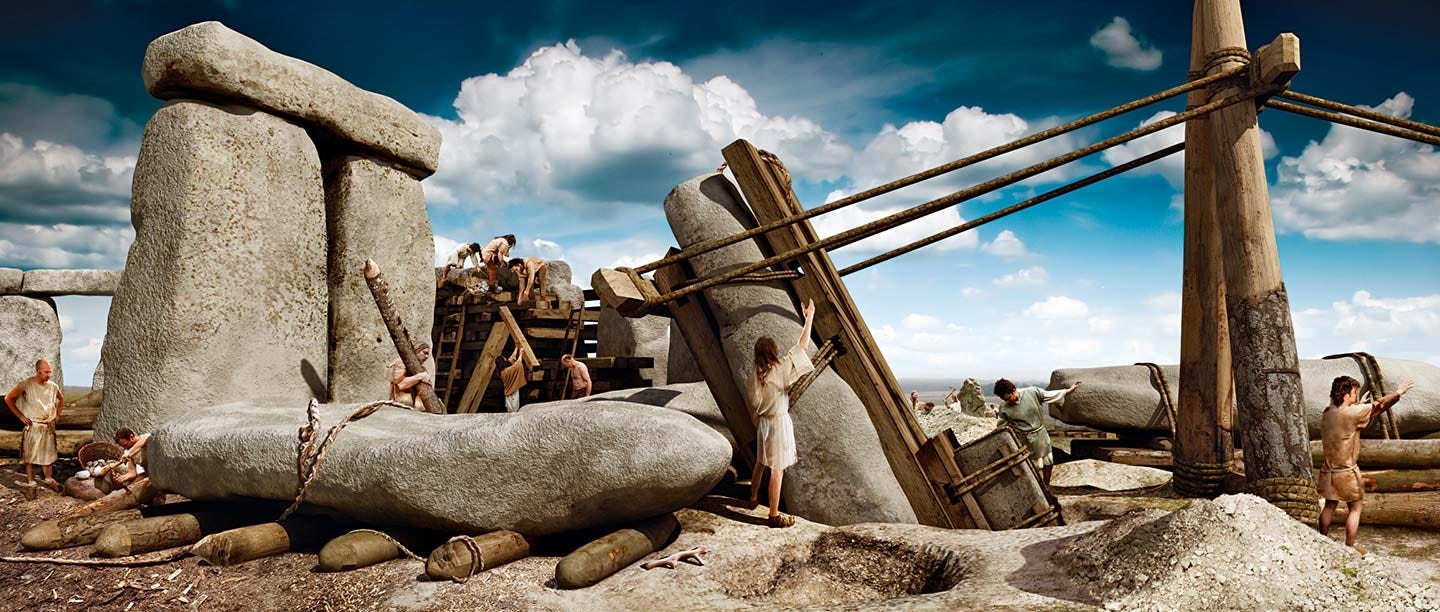Stonehenge, Carbon-Cultists, and Nostalgia for the Real
As some of you probably know, I began blogging back in 2020 to express my concerns over what appeared to be a technocratic coup within the environmental movement. The back-to-nature ethos of the 20th century green movement, as naïve as it could be, was being replaced with a pseudoscientific vision of lab-grown food, genetically-engineered ecosystems, and 'renewable' energy tech (and, of course, unlimited migration because climate-change). A number of commentators, such as Neoliberal Feudalism, have referred to this process as 'skinsuiting'.
The impetus for all this nonsense is, of course, the drive towards 'net-zero' carbon-emissions. Whether the elites actually believe that you can power an industrial civilization without fossil-fuels, or this impossible ambition is simply a cover-story for the controlled-demolition of the world's economy, is anyone's guess at this point; what seems clear to me is that the narcissistic tantrums of Extinction Rebellion and, latterly, Just Stop Oil act as a convenient means by which politicians can present an apparently watered-down and 'moderate' version of net-zero by comparison to the demands of a bunch of purple-haired maniacs.
See, for instance, top Labour NPC Keir Starmer's condemnation of the activists who vandalised Stonehenge just before the Summer Solstice. Starmer, who will probably be Airstrip-One's next Federal Commissar, can simultaneously appeal to the Sensible Majority by distancing himself from the freaks, while promoting net-zero policies in his own future government.
Talking of the freaks, Morgoth writes:
In the Kali Yuga, life becomes death, and the sacred and mythological become “just piles of rocks”. So saturated are we in the profane and materialistic that it can be quite daunting to argue against the desacralizing bugman logic. The sun is naught but a gas ball, the moon barren, and the earth about to burn up, erasing life. The great pretence and lie is that life, as seen entirely through late-stage scientism and liberalism, has delivered a world more rational and less supernatural than a mythology wherein Merlin used magic to construct Stonehenge. The argument “it’s just a pile of rocks, saving the world from climate change through government regulation matters more” deploys empiricism to justify its own insanity.
As I was raised in the peripheries of the British anarchist and ecological scenes from the late 1980s, the process of enantiodromia – the transmutation of one thing into its polar opposite – is striking here. The 1990s saw a massive expansion of Britain's road infrastructure, which led to an enormous grassroots (although inevitably highly infiltrated) protest campaign. Many of these protestors saw themselves as engaged in a spiritual struggle with the British state, to defend the sacred landscape of the island; some of the more conspiratorially-inclined even suggested that the planned roads were deliberately routed through ancient sacred sites, as a way to disrupt the subtle energy-channels of the landscape.
Thirty years later, and many of those veteran road-protestors have joined up with XR rallies and suchlike, believing that the hysterical maniacs claiming that we have 3 months until climate-armageddon are the natural successors to their own movement. How many of them will be smelling a rat, now that Just Stop Oil have revealed what they truly think of Albion's sacred landscape? Merely a load of hills and old rocks, waiting to be sprayed with toxic, hydrocarbon-based substances in a futile and self-defeating protest - against the use of toxic, hydrocarbon-based substances.
As I wrote back in 2022, regarding the soup-attacks on classic paintings:
The choice of both target and weapon are interesting, however; they could have chosen some shoddy bit of 1990s conceptual nonsense that only the most tedious of pseuds would pretend to like, such as Damien Hirst's Some Animal I Killed Because I'm Clever or Tracey Emin's Fakin Ell Mate Look At Me Laundry Basket, and made a statement about art that the majority of the population could get behind, thereby generating more support for their campaign. Ecological destruction makes the world an ugly place in the same way that postmodern art makes the gallery an ugly place, so a campaign of green art-terrorism promoting traditionalist aesthetics would at the very least be a refreshing change of pace. Short of that, at least choosing to throw a tin of soup over Andy Warhol's Campbell's Soup Can would be a more appropriate and wryly amusing action. But the painting they chose to vandalise was a classic of representational Western painting, depicting the beauty and harmony of natural form; the fact that the painter was a Straight White Cisgendered Male also probably helped to inform their decision. Can you imagine how these activists would feel if someone threw a tin of baked beans over a Frida Kahlo painting?
Following on from this line of interpretation, I suppose that a stone temple built in the Bronze Age in alignment with the movements of the sun would be about as phallo-logocentric as it gets. Perhaps these numpties have taken the 'longhouse' meme too literally, and are enacting a posthumous revenge against the Bell Beaker pastoralists who, ahem, erected the stones in the first place?
At the beginning of this month, I gave a presentation on the woke distortion of history at the Commonwealth of Free Spirits conference in Porto. It was a rather lukewarm speech at best, and I relied too heavily on a facade of glibness to disguise my uncertainty and lack of preparation.
What I was trying to say is that collective derangement that gives rise to 'wokeness' is a response to collapse-anxiety. Deep down, we all know and feel that the super-structures of our society are falling apart, and very few people feel well-prepared for what's coming (and even the ones who do are probably wrong). Ironically, this was reflected at a microcosmic level during my presentation – unprepared for collapse, I began to flounder. I styled it out well enough that I didn’t have to superglue my face to the stage, but those who knew me well enough could see what was going on.
I suspect this is why people get so deeply involved in electoral politics. I'm not making any particular stand for or against voting, campaigning, or standing for office – these are decisions that must be made by the individual based on their own circumstances. But looking to electoral politics for a sign that someone else can take charge of the situation is, at least in part, motivated by a fear of the uncertainty and chaos of existence.
After the conference, I had plenty of experience grounding myself by getting to grips with the world of matter. Travelling across the border to Spain, I assisted Jasun Horsley in the building of a goat-shed, and on my return to Blighty, undertook a certification in MovNat, a natural movement ‘system’ (if such a paradox can be permitted). As such, I’m now a qualified Level 1 MovNat trainer, with my Level 2 still to come. I doubt I’ll write about that much on this blog, though, as crawling on logs and suchlike is much more interesting to actually participate in than to read about.
Behind all of the questions about whether the Just Stop Oil losers are engaging in an assault on Western culture going back further and further into the past - perhaps the cave paintings of Lascaux are next? - maybe they are simply frustrated that they will never, ever build something as cool as Stonehenge.
Tom Wolfe called this ‘nostalgia for the real’. Perhaps if they just built someone a nice goat-shed, they’d feel better.
Source: Flint & Steel


Comments
Post a Comment